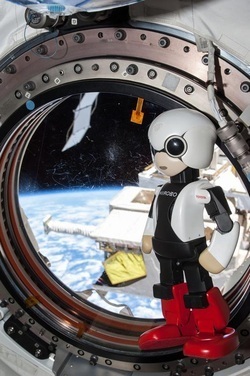Bascomb James's Blog, page 7
July 11, 2014
SciFi Writers - The Shamans of Modernity
 From http://www.old-picture.com The mention of Shamanism in contemporary culture usually evokes stereotypical images of witch doctors, new age spiritualists, and traditional healers. So what do shamanism, with its 10,000 year old religious and cultural traditions and modern science fiction have in common?
From http://www.old-picture.com The mention of Shamanism in contemporary culture usually evokes stereotypical images of witch doctors, new age spiritualists, and traditional healers. So what do shamanism, with its 10,000 year old religious and cultural traditions and modern science fiction have in common? In its simplest incarnation, shamanism is a form of animism practiced by some traditional cultures. These cultures believe that the world is filled with willful spirits that have the ability to cause mishaps, pain, and loss. Traditional cultures were helpless in the face of these spirits and they employed individual and group rituals to appease or neutralize them. Shamans were the spiritual soldiers of these cultures. They warned of dangers; they were the spiritual guardians of the community; and they served as the spiritual compass.
The social forces within our contemporary world are not significantly different from those found in traditional cultures. Our world is shaped by science and technology – whimsical and willful modern-day spirits that can be helpful or cause total chaos. Members of our global village often feel powerless in the face of these pervasive technologies and most of us have only a rudimentary knowledge of the benefits, limitations, and social impact of these technologies, these spirits. Despite this lack of knowledge, our community is often asked through legislative referenda, to judge the social, scientific, and moral impact of cutting-edge technologies. Decisions that have significant future consequences are being made by members who barely have the technological wherewithal to program their DVR. Within this community, Shamans of Modernity, through their science stories help us to better understand the spirit world of modern technology and how these technologies interact and shape our community. Like the traditional Shamans, the Shamans of Modernity act as intermediaries between the human world and the spirit worlds. Unlike the traditional shamans, SF writers cannot compel the spirits to do their will.
The Wikipedia entry on Shamanism tells us that “The shaman […] enters supernatural realms or dimensions to obtain solutions to problems afflicting the community. Shamans may visit other worlds/dimensions to bring guidance to misguided souls and to ameliorate illnesses of the human soul caused by foreign elements.” SF writers as Shamans of Modernity, perform a similar service by transplanting parts of our culture to other worlds so that they can be examined in a non-threatening way. In Charlie Jane Anders post on io9 Lorenzo DiTommaso, a religion professor at Concordia University, tells us “Science fiction is great for proposing answers to huge questions, without being stymied by "theological firewalls," or having to stick to the rigor of formal philosophy.” In the same post, James McGrath, a Butler University theologian who writes for the Exploring Our Matrix blog tells us that “Science fiction provides a great way of asking what theological and philosophical ideas from the past still make sense in our modern context, of winnowing out those that do not, and of exploring ways to adapt and update those that … require a bit of tweaking.” One debated etymology of the word “shaman” is “one who knows.” In my estimation, the Shaman of Modernity is “one who illuminates.” The Shamans of Modernity are not expected to provide the answers – asking questions and exploring alternatives are important (and sometimes troubling) services that should be valued by every community.
In our increasingly interconnected world, we are constantly confronted by others - others who outwardly resemble us but do not believe or act like us. Unfortunately, our reaction to “otherness” has not changed significantly in the past 10,000 years. By traveling to other worlds, the Shamans of Modernity show us the “human face” of the others, placing them into a social context that can make them less (or more) threatening. Their stories often have meaning in our modern world. The Shamans of Modernity have shown us what it feels like to have your culture destroyed by an advanced civilization whose benevolent intent is to uplift the ignorant savages and “improve” their lives. They have described the rise of the Corporations and Super PACs who buy legislators and expect them to pass laws favoring them and their ideological dogma. They told us stories about surveillance and identity theft before they became part of the daily lexicon. Increasingly, the Shamans of Modernity have been exploring how it feels to live an age of unchecked biotechnology and bioengineering advances. By employing the strongest of the shamanic traditions, the Shamans of Modernity provide an allegorical framework for examining our world, our attitudes, and our mores. Their stories help us to understand the consequences of our individual and collective choices.
So how do they do it? To be effective, Shamans of Modernity must understand the society they live in – its ethical, social, and belief structures. They need to be grounded in the “now” so that their exploration of other worlds and other times has relevance to their global village. Do they get it right? Not hardly! But SF is the literature of ideas; it is an illuminating force that penetrates the dark areas of our Id, giving the unseen spirits that lurk there shape, form and understanding.
The more things change, the more they stay the same. Our outwardly sophisticated, globally interconnected society is fragmented into nano-techno-bio-eco-geo-ethno-ideo-whatever subcultures. The inhabitants of these villages have the same primitive fears of the unknown, unforeseeable, and uncontrollable spirits their earliest ancestors possessed. Shamans of Modernity, through their allegorical stories, spiritual voyages to other universes, and their ability to humanize the unknown, help us all to better understand who we are and where we stand within our societies.
Published on July 11, 2014 13:42
July 8, 2014
My Intro for the Far Orbit Anthology
It all started with a letter…
Yes, that letter. The letter from Elizabeth Bear. The one published in ClarkesWorld Issue 68 (May 2012) . Her open letter to Science Fiction.
After reading her letter, we could have applauded like many others and blithely wandered off with our hands in our pockets. Instead, we decided to do something. This is the result – a new anthology that is fun to read and embodies many of the elements found in classic, Grand Tradition science fiction. In short, we decided put our money where our heart is.
So what is Grand Tradition science fiction? I am not going to give you the Wikipedia answer, I am giving my answer. Your mileage may vary.
Grand Tradition stories were full of ideas, optimism, inspiration and respect for science. Grand Tradition SF showed us that science was cool. Like many others, I chose a career in science because it was the most exciting thing in my universe. The wonder of discovery; the satisfaction that comes from building new things; and the knowledge that you can make a difference through intellect (or cleverness), hard work and perseverance, are heady of experiences. There are no magic wands, fairy godpeople, or Miracle Max inventions. Grand Tradition stories inspired many of our current technologies and it continues help scientists understand how these technologies might interact with the real world.
Grand Tradition stories were fun to read. In her open letter to SF, Elizabeth Bear asks why “[SF seems] to think that nothing fun can have value.” I obviously agree with her sentiments. I am sorry to say that a derisive public wrote off Grand Tradition SF as mere escapism - as if escapism was something unsavory. This escapist “drek” taught me about Dyson Spheres, red-shift, general relativity, and put entire cultures and belief systems under the intellectual microscope. Not too bad for escapist literature.
Grand Tradition Stories embodied a sense of adventure and expectation. I realize that adventure is a relative term. One man’s adventure may be a normal day to another. Communicating this sense of adventure is the important thing. Readers of Grand Tradition stories have a gleeful expectation that interesting things are about to happen; that “normal” events will not remain that way for long.
And finally, the best Grand Tradition stories had a strong human element. Great SF is not just about gizmos and spaceships, it’s about us and how we are shaped by, and relate to our environment. Human elements are the Velcro that make stories stick in our brain. They make them enjoyable, approachable, and memorable.
The stories in this volume embody one or more of these elements.
The Far Orbit anthology is truly a labor of love but no matter how much I express my ardor, it’s all about the stories. We endeavored to provide a broad mix of SF stories by established, award-wining authors and newly emerging authors. Their stories embody a variety of SF motifs including those from 1940s pulp-fiction, realistic hard SF, noir fiction, spaceship fiction, alien encounters, and action-adventure. The range of subjects is astonishing and includes slimy alien babysitters, an angry sentient bear, walking plants, alien bunnies, and a barbecue. If that is not enough to pique your interest, the anthology also features a cello-playing assassin, high-stakes poker emancipation, space ship crashes/rescues, an alien artifact, and fights with space pirates. We hope every SF fan can find a favorite within these pages.
So here it is, our latest creation. We obviously want the Far Orbit anthology to be successful for financial reasons but just as importantly, we know a successful approach will be emulated by more conservative publishers. The net result could be a future where there is a wider variety of Grand Tradition story choices and story markets – good things in my estimation.
This anthology isn’t just about us and our desires; it’s also about you, the new SF reader, the SF fan, the aspiring (or established) writer. Let me know what you think of this anthology and where we should go from here. I will be “listening” at: farorbit@worldweaverpress.com
Bascomb James
Anthologist, Far Orbit: Speculative Space Adventures
Yes, that letter. The letter from Elizabeth Bear. The one published in ClarkesWorld Issue 68 (May 2012) . Her open letter to Science Fiction.
After reading her letter, we could have applauded like many others and blithely wandered off with our hands in our pockets. Instead, we decided to do something. This is the result – a new anthology that is fun to read and embodies many of the elements found in classic, Grand Tradition science fiction. In short, we decided put our money where our heart is.
So what is Grand Tradition science fiction? I am not going to give you the Wikipedia answer, I am giving my answer. Your mileage may vary.
Grand Tradition stories were full of ideas, optimism, inspiration and respect for science. Grand Tradition SF showed us that science was cool. Like many others, I chose a career in science because it was the most exciting thing in my universe. The wonder of discovery; the satisfaction that comes from building new things; and the knowledge that you can make a difference through intellect (or cleverness), hard work and perseverance, are heady of experiences. There are no magic wands, fairy godpeople, or Miracle Max inventions. Grand Tradition stories inspired many of our current technologies and it continues help scientists understand how these technologies might interact with the real world.
Grand Tradition stories were fun to read. In her open letter to SF, Elizabeth Bear asks why “[SF seems] to think that nothing fun can have value.” I obviously agree with her sentiments. I am sorry to say that a derisive public wrote off Grand Tradition SF as mere escapism - as if escapism was something unsavory. This escapist “drek” taught me about Dyson Spheres, red-shift, general relativity, and put entire cultures and belief systems under the intellectual microscope. Not too bad for escapist literature.
Grand Tradition Stories embodied a sense of adventure and expectation. I realize that adventure is a relative term. One man’s adventure may be a normal day to another. Communicating this sense of adventure is the important thing. Readers of Grand Tradition stories have a gleeful expectation that interesting things are about to happen; that “normal” events will not remain that way for long.
And finally, the best Grand Tradition stories had a strong human element. Great SF is not just about gizmos and spaceships, it’s about us and how we are shaped by, and relate to our environment. Human elements are the Velcro that make stories stick in our brain. They make them enjoyable, approachable, and memorable.
The stories in this volume embody one or more of these elements.
The Far Orbit anthology is truly a labor of love but no matter how much I express my ardor, it’s all about the stories. We endeavored to provide a broad mix of SF stories by established, award-wining authors and newly emerging authors. Their stories embody a variety of SF motifs including those from 1940s pulp-fiction, realistic hard SF, noir fiction, spaceship fiction, alien encounters, and action-adventure. The range of subjects is astonishing and includes slimy alien babysitters, an angry sentient bear, walking plants, alien bunnies, and a barbecue. If that is not enough to pique your interest, the anthology also features a cello-playing assassin, high-stakes poker emancipation, space ship crashes/rescues, an alien artifact, and fights with space pirates. We hope every SF fan can find a favorite within these pages.
So here it is, our latest creation. We obviously want the Far Orbit anthology to be successful for financial reasons but just as importantly, we know a successful approach will be emulated by more conservative publishers. The net result could be a future where there is a wider variety of Grand Tradition story choices and story markets – good things in my estimation.
This anthology isn’t just about us and our desires; it’s also about you, the new SF reader, the SF fan, the aspiring (or established) writer. Let me know what you think of this anthology and where we should go from here. I will be “listening” at: farorbit@worldweaverpress.com
Bascomb James
Anthologist, Far Orbit: Speculative Space Adventures
Published on July 08, 2014 13:44
July 3, 2014
SciFi and the Dangerfield Effect
I just read Simon Kewin’s blog illustrating how some people have a stereotypical dislike of science fiction, and I was reminded about an incident that happened a few years ago.
I was walking with a colleague along the one of the labyrinthine back corridors of a major medical center and he asked me how I got interested in my career field. I told him that as a child, I read a lot of stories about scientists who did important things, solved important problems, and made the world a better place. Being a scientist was uber-cool and I gravitated toward scientific studies in school.
“What kind of stories did you read?” he asked.
“I read action-adventure stories as most young boys will, some biographies too. But mostly I read a lot of science fiction.”
At this point we heard a snort of derision from a nurse who was following closely and eavesdropping on our conversation. She quickly opened the gap as if the conversation had somehow become unsavory.
I call this the Dangerfield Effect after the American Comedian whose catchphrase was, "I don't get no respect!" Paradoxically, generations of scientists, engineers, and inventors have attributed their interest in science and the “science of making stuff” to SciFi stories.
We all want people to love us and respect what we do. Maybe it would help if we told the SciFi derisionists we wrote about sociology, political intrigues, the long term effects of public policy, and the role of technology in social change. Maybe if we portrayed ourselves as the literary underdogs, or the little group who could... Maybe...? **Sigh** Maybe not. Rodney, I feel for you, man.
I was walking with a colleague along the one of the labyrinthine back corridors of a major medical center and he asked me how I got interested in my career field. I told him that as a child, I read a lot of stories about scientists who did important things, solved important problems, and made the world a better place. Being a scientist was uber-cool and I gravitated toward scientific studies in school.
“What kind of stories did you read?” he asked.
“I read action-adventure stories as most young boys will, some biographies too. But mostly I read a lot of science fiction.”
At this point we heard a snort of derision from a nurse who was following closely and eavesdropping on our conversation. She quickly opened the gap as if the conversation had somehow become unsavory.
I call this the Dangerfield Effect after the American Comedian whose catchphrase was, "I don't get no respect!" Paradoxically, generations of scientists, engineers, and inventors have attributed their interest in science and the “science of making stuff” to SciFi stories.
We all want people to love us and respect what we do. Maybe it would help if we told the SciFi derisionists we wrote about sociology, political intrigues, the long term effects of public policy, and the role of technology in social change. Maybe if we portrayed ourselves as the literary underdogs, or the little group who could... Maybe...? **Sigh** Maybe not. Rodney, I feel for you, man.
Published on July 03, 2014 20:09
•
Tags:
acceptance, dangerfield-effect, respect, scifi
July 2, 2014
SciFi and the Dangerfield Effect
Published on July 02, 2014 17:17
June 26, 2014
What Would Your Robot Say?
 Last August, I read that Kirobo, the first robotic astronaut arrived at the International Space Station. The doll-sized humanoid robot weighs about 2 pounds, speaks Japanese, and has been heralded as the first robot to speak in space. When powered up, its historic greeting was, “On August 21, 2013, a robot took one small step toward a brighter future for all," paying homage to Neil Armstrong’s moon landing speech.
Last August, I read that Kirobo, the first robotic astronaut arrived at the International Space Station. The doll-sized humanoid robot weighs about 2 pounds, speaks Japanese, and has been heralded as the first robot to speak in space. When powered up, its historic greeting was, “On August 21, 2013, a robot took one small step toward a brighter future for all," paying homage to Neil Armstrong’s moon landing speech. While I understand and appreciate the sentiment behind the message, the SF fan in me wanted to hear something else. I would have been “over the moon” happy if the first words from a robotic astronaut were “Hello Dave” honoring instead, Arthur C. Clarke and Stanley Kubrick’s HAL9000 robot. After all, both Kirobo and HAL9000 have facial recognition, speech recognition, and natural language processing capabilities. Lest you think of HAL9000 only as the villain, the computer saved the day in Arthur C. Clarke’s 2010: Odyssey Two.
If you could write the first words a robotic astronaut would speak in outer space, what would they be? I would love to hear your responses.
Published on June 26, 2014 07:23
June 22, 2014
Musings on NASA’s Asteroid Retrieval Mission
 As I read the recent
NBC News article
about NASA’s proposed Asteroid Retrieval Mission, I couldn’t help but think about Sam Kepfield’s story, Open for Business, in the
Far Orbit Anthology
. Sam’s story about capturing an asteroid and bringing it back to earth is so timely it could have been ripped from today’s headlines. It also shows us that good science fiction doesn’t have to be about some far off future or set in the far reaches of the universe. It can happen around the corner, down the street, or in our back yard.
As I read the recent
NBC News article
about NASA’s proposed Asteroid Retrieval Mission, I couldn’t help but think about Sam Kepfield’s story, Open for Business, in the
Far Orbit Anthology
. Sam’s story about capturing an asteroid and bringing it back to earth is so timely it could have been ripped from today’s headlines. It also shows us that good science fiction doesn’t have to be about some far off future or set in the far reaches of the universe. It can happen around the corner, down the street, or in our back yard.In addition to NASA’s plans to snag an asteroid, two companies, Deep Space Industries and Planetary Resources have announced measured initiatives to begin asteroid prospecting operations using small CubeSats and off-the-shelf technologies. Open for Business floats effortlessly on this sea of current events. The story reads like mid-century science fiction but there is a twist. Rather than following the steely-eyed lead scientist, the author gives us a more human story by making the point of view character a slightly neurotic attorney.
Anyway, these are the things that went through my mind while reading the NASA story.
Published on June 22, 2014 06:05
June 21, 2014
SF Authors and Editors as Agents of Change
We all know about the technological links between science fiction and invention. Technologies from submarines to cell phones to the internet were first described in science fiction stories and engineers went on to build these devices. Identity theft, once the stuff of science fiction, is not fiction in today’s interconnected world. So yes, science fiction writers and their imaginations can be agents of change in our rapidly evolving technology-driven world. In the face of these feel-good emotions about SF,
William Gibson has written
that SF writers can’t predict the future and they certainly don’t get it right all the time. While he certainly has a valid point, SF writers do present a number of technological possibilities that sometimes become self-fulfilling prophesies. Computer scientist Alan Kay, is quoted as saying “the best way to predict the future is to invent it."
Less has been written about the role SF writers play in shaping how we feel about science and the future. Stories are powerful things and humans are hard-wired to learn from stories and storytelling. Good storytelling creates strong emotional hash tags that anchor actions and outcomes in our brains forever. If we really are what we consume, a storytelling diet rich in decay, despair, and the evils of science will certainly influence how we, as readers, perceive the world. For this reason, I tend to agree with recent comments and editorials from Elizabeth Bear and Neil Stephenson that we need more optimism in SF. Granted, we may be facing a chicken or egg dilemma on this one. Are we reading depressing stories because we feel we live in depressing times or do we feel we live in depressing times because we read depressing stories?
John Campbell and many other editors have shown that editors too, can be agents of change in science fiction and society. In my role as volume editor and Far Orbit anthologist, I was uniquely positioned to set the tone for the anthology. Rather than writing about my preferences for more optimism, I decided to pay people for their optimistic SF stories. It seemed like a win-win solution to me. The result is Far Orbit: Speculative Space Adventures – a new anthology that’s science positive, fun to read, and embodies many of the elements found in classic, Grand Tradition science fiction. Long story short, we put our money where our heart is.
I hope Far Orbit finds a place in your heart too.
Far Orbit is available in Paperback and electronic versions from
Amazon
Barnes & Noble
Books-A-Million
Goodreads
!ndigo
Kobo
Independent Bookstores
Less has been written about the role SF writers play in shaping how we feel about science and the future. Stories are powerful things and humans are hard-wired to learn from stories and storytelling. Good storytelling creates strong emotional hash tags that anchor actions and outcomes in our brains forever. If we really are what we consume, a storytelling diet rich in decay, despair, and the evils of science will certainly influence how we, as readers, perceive the world. For this reason, I tend to agree with recent comments and editorials from Elizabeth Bear and Neil Stephenson that we need more optimism in SF. Granted, we may be facing a chicken or egg dilemma on this one. Are we reading depressing stories because we feel we live in depressing times or do we feel we live in depressing times because we read depressing stories?
John Campbell and many other editors have shown that editors too, can be agents of change in science fiction and society. In my role as volume editor and Far Orbit anthologist, I was uniquely positioned to set the tone for the anthology. Rather than writing about my preferences for more optimism, I decided to pay people for their optimistic SF stories. It seemed like a win-win solution to me. The result is Far Orbit: Speculative Space Adventures – a new anthology that’s science positive, fun to read, and embodies many of the elements found in classic, Grand Tradition science fiction. Long story short, we put our money where our heart is.
I hope Far Orbit finds a place in your heart too.
Far Orbit is available in Paperback and electronic versions from
Amazon
Barnes & Noble
Books-A-Million
Goodreads
!ndigo
Kobo
Independent Bookstores
Published on June 21, 2014 08:54
June 12, 2014
Far Orbit Interview on SciFi4Me.com
 The other night, I had a chance to talk about the
Far Orbit anthology
with Jason Hunt from SciFi4Me on blogtalk radio. Jason also interviewed Far Orbit author Wendy Sparrow (“A Game of Hold’em”) about her contribution and her new upcoming book. You can learn more about Wendy by listening to the interview and visiting her website: http://wendysparrow.com.
The other night, I had a chance to talk about the
Far Orbit anthology
with Jason Hunt from SciFi4Me on blogtalk radio. Jason also interviewed Far Orbit author Wendy Sparrow (“A Game of Hold’em”) about her contribution and her new upcoming book. You can learn more about Wendy by listening to the interview and visiting her website: http://wendysparrow.com. The site was having serious technical difficulties. The interview started late and Far Orbit author Eric Choi (“From a Stone”) was locked out completely. It was a pity, because I was looking forward to hearing what Eric had to say. Eric is the first winner of the Asimov Award (now the Dell Magazines Award) and he is an Aurora Award winner for his anthology “The Dragon and the Stars.” Eric is an aerospace engineer who worked on the Phoenix Mars Lander meteorology payload and he was among the final forty candidates (out of more than 5,000) vying to become the third cadre of Canadian astronauts. Eric is currently co-editing the forthcoming a hard SF anthology “Carbide Tipped Pens” with Ben Bova which will be published at end of the year by Tor books. You can find out more about Eric by visiting his website: http://www.aerospacewriter.ca/
You can listen to our abbreviated interview by following the link below. Please move ahead to the seven minute mark to skip over Jason’s exasperated and valiant efforts to vanquish the Google gremlins who were gleefully pulling wires and connection thingies from his control board. Note to self: Need to invent a better digital bug spray.
http://www.blogtalkradio.com/scifi4me/2014/06/11/scifi4me-live-from-the-bunker-140610
Thanks, Jason. I enjoyed talking with you and Wendy.
Published on June 12, 2014 11:01
June 4, 2014
Early Reading Experiences
Books and reading were an important part of my early childhood experiences. As a young boy, I read a mish-mash of science fiction, adventure, mysteries, and military fiction stories.
My family did not have much money and our small town library did not stock many science fiction titles, so we swapped books a lot. One of my neighbors and a few of my dad’s friends were voracious readers and every month or so, Dad would bring home a grocery bag full of dog-eared paperbacks. The bags exuded that wonderful aroma of musty-dusty shelves and old paper. For me, the bags were equal parts reality and magic. Every cover was a doorway to distant lands, new sights, and new adventures. I can still remember my delight when I pulled the first head-to toe (tête-bêche) book from the bag. The back cover of the first book was actually the front cover of the second book, but rotated 180 degrees. How cool was that? Because so many people contributed to each bag, the contents also included a wild mixture of other titles and genera. Sometimes the bag contained a classic such as Ivanhoe, a Western horse opera, Doc Savage, or a Mickey Spillane book. Special bags would have one or two yellowed copies of SciFi magazines like Astounding or Amazing Stories. I don’t know if it was my imagination or reality, but the older yellowed books always seemed lighter than the newer books.
With this sharing program, I always had five to ten books waiting to be read. I would read the books and return them to the bag. When the bag was full, I swapped it with my neighbor for a bag of his books. My dad would take my neighbor’s books and swap them with one of his friends. I never really knew how far this sharing circle extended, but I was grateful for its existence.
My family did not have much money and our small town library did not stock many science fiction titles, so we swapped books a lot. One of my neighbors and a few of my dad’s friends were voracious readers and every month or so, Dad would bring home a grocery bag full of dog-eared paperbacks. The bags exuded that wonderful aroma of musty-dusty shelves and old paper. For me, the bags were equal parts reality and magic. Every cover was a doorway to distant lands, new sights, and new adventures. I can still remember my delight when I pulled the first head-to toe (tête-bêche) book from the bag. The back cover of the first book was actually the front cover of the second book, but rotated 180 degrees. How cool was that? Because so many people contributed to each bag, the contents also included a wild mixture of other titles and genera. Sometimes the bag contained a classic such as Ivanhoe, a Western horse opera, Doc Savage, or a Mickey Spillane book. Special bags would have one or two yellowed copies of SciFi magazines like Astounding or Amazing Stories. I don’t know if it was my imagination or reality, but the older yellowed books always seemed lighter than the newer books.
With this sharing program, I always had five to ten books waiting to be read. I would read the books and return them to the bag. When the bag was full, I swapped it with my neighbor for a bag of his books. My dad would take my neighbor’s books and swap them with one of his friends. I never really knew how far this sharing circle extended, but I was grateful for its existence.
Published on June 04, 2014 11:56
May 22, 2014
Great News from Sporadic Reviews!
 A little while ago, we sent Kevin Bayer at Sporadic Book Reviews an eARC of the Far Orbit anthology. Book reviewers get so many requests so I was pleased when I heard Kevin decided to review it. His rating was….
A little while ago, we sent Kevin Bayer at Sporadic Book Reviews an eARC of the Far Orbit anthology. Book reviewers get so many requests so I was pleased when I heard Kevin decided to review it. His rating was….Drum roll please……
5 of 5 stars! He also posted a 5-star review on Amazon.
His take away message:
“ Need a quick fix of good old-fashioned science fiction? Far Orbit is it! ”
Other terrific reviews have been posted on Good Reads, Amazon, and Tangent. My sincere thanks go out to everyone who took the time to post a review. Your feedback is invaluable!
If you would like a pleasant diversion during your holiday weekend, I suggest picking up the Kindle version of Far Orbit. It makes a great book buddy.
Published on May 22, 2014 17:19

 Comedian Rodney Dangerfield I just read
Comedian Rodney Dangerfield I just read 

